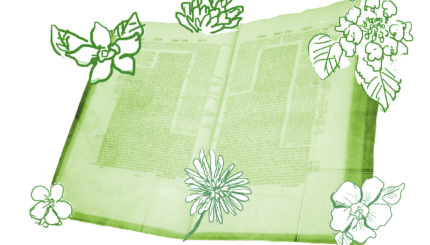In the Torah, we are told that if a woman is guilty of adultery, upon drinking the bitter waters of the sotah, “her belly swells and her thigh falls away.” (Numbers 5:27) In a mishnah on today’s daf, we learn some additional lurid details:
She does not manage to finish drinking before her face turns green and her eyes bulge, and her skin becomes full of protruding veins, and the people say: “Remove her, so that she does not render the Temple courtyard impure.”
Yikes! (Who else is picturing the Wicked Witch of the West? Or the climactic scene in Raiders of the Lost Ark?) According to Maimonides, this cinematic greening of the face, soon to be followed by bulging eyes and veins, is the first sign that a woman has failed the test, and that the priest needs to whisk her out of the Temple lest she defile it either because the stress will cause her to suddenly menstruate (we have seen this idea before in our Daf Yomi studies, on Yevamot 37b) or because it is a portent of her immediate demise, which will bring corpse impurity to the sacred sanctuary. (Mishneh Torah, Sotah 3:16)
In some cases, though, a woman might be guilty of adultery and … nothing happens. How can this be?

Help us keep Jewish knowledge accessible to millions of people around the world.
Your donation to My Jewish Learning fuels endless journeys of Jewish discovery. With your help, My Jewish Learning can continue to provide nonstop opportunities for learning, connection and growth.
If she has merit, it delays punishment for her, and she does not die immediately. There is a merit that delays punishment for one year, there is a larger merit that delays punishment for two years, and there is a merit that delays punishment for three years.
Ben Azzai states: A person is obligated to teach his daughter Torah, so that if she drinks (and does not die immediately), she will know that some merit has delayed punishment for her.
Rabbi Eliezer says: Anyone who teaches his daughter Torah is teaching her tiflut.
The mishnah states that a woman who has accrued merit through Torah study will delay the punishment of the bitter waters. But then, we have a stark difference of opinion between Ben Azzai and Rabbi Eliezer around whether girls should even learn Torah in the first place. Ben Azzai says a parent is obligated to teach her specifically so that the merit gained through her learning will delay the effects of the bitter waters, even if she had indeed committed adultery. This delay presumably allows a woman to survive the ritual with her marriage (and her ketubah) intact — for a little while, anyway. It also obviates the potential defilement of the Temple that the mishnah (and Maimonides) fear might occur from her punishment.
Rabbi Eliezer, however, believes that girls should not learn Torah because it is tiflut — a word that means vanity, suggesting Torah study will be ineffectual for girls who do not have the mental capacity to absorb it. But tiflut can also mean sexual licentiousness and perhaps Rabbi Eliezer’s thinking here is that precisely because girls will know that their merit accrued through Torah study will delay the deserved punishment, they are more likely to commit adultery. Either way, for Rabbi Eliezer, teaching Torah to daughters is not permitted: Either because she cannot absorb it and so it is a waste of time, or because he fears she will weaponize that learning in order to commit adultery and then protect herself from the bitter waters’ effects.
With regard to the sotah, both positions on Torah study are understandable. We can understand Ben Azzai’s instinct for parents to protect daughters from punishment, and Rabbi Eliezer’s typically stern instinct to do nothing that will forestall just deserts.
But where does that leave us on the question of whether girls should study Torah? First, let’s remember that the anonymous opinion in the mishnah, usually taken as authoritative, is that they should. Ben Azzai supports it, and only Rabbi Eliezer objects. Further, if girls are forbidden to study Torah, what do we do with the (non-gendered) famous rabbinic dictum of Mishnah Peah 1:1: “Talmud Torah k’neged kulam — The study of Torah is equivalent to all (other mitzvot)”?
Of course, Rabbi Eliezer’s position was culturally conditioned: In his day, the world of Talmud study was open only to men (mostly). Because that was the lived reality of women, he wrote that reality into the law. The few learned women named in the Talmud, like Rabbi Meir’s wife Beruriah, seem to be the exception that proves the rule.
Today, thankfully, things are different. I and some of my fellow Daily Dose writers are women, as are tens of thousands of our readers and Talmud students the world over. Rashi famously taught his daughters Torah and the transition to an acceptance of women as regular learners of Torah has been endorsed by many halakhic authorities in recent centuries. Inclusion of women in the enterprise of Torah study stems not only from modernity in general, but from an understanding that when girls learn Torah it has a positive influence on their future families, including their sons (and daughters). Perhaps we might reply to Rabbi Eliezer that even if learning Torah will allow a woman to temporarily escape the punishment of the bitter waters, studying Torah could also lead her to better understand the gravity of the crime of adultery and discourage her from committing it in the first place.
Read all of Sotah 20 on Sefaria.
This piece originally appeared in a My Jewish Learning Daf Yomi email newsletter sent on April 18th, 2023. If you are interested in receiving the newsletter, sign up here.



